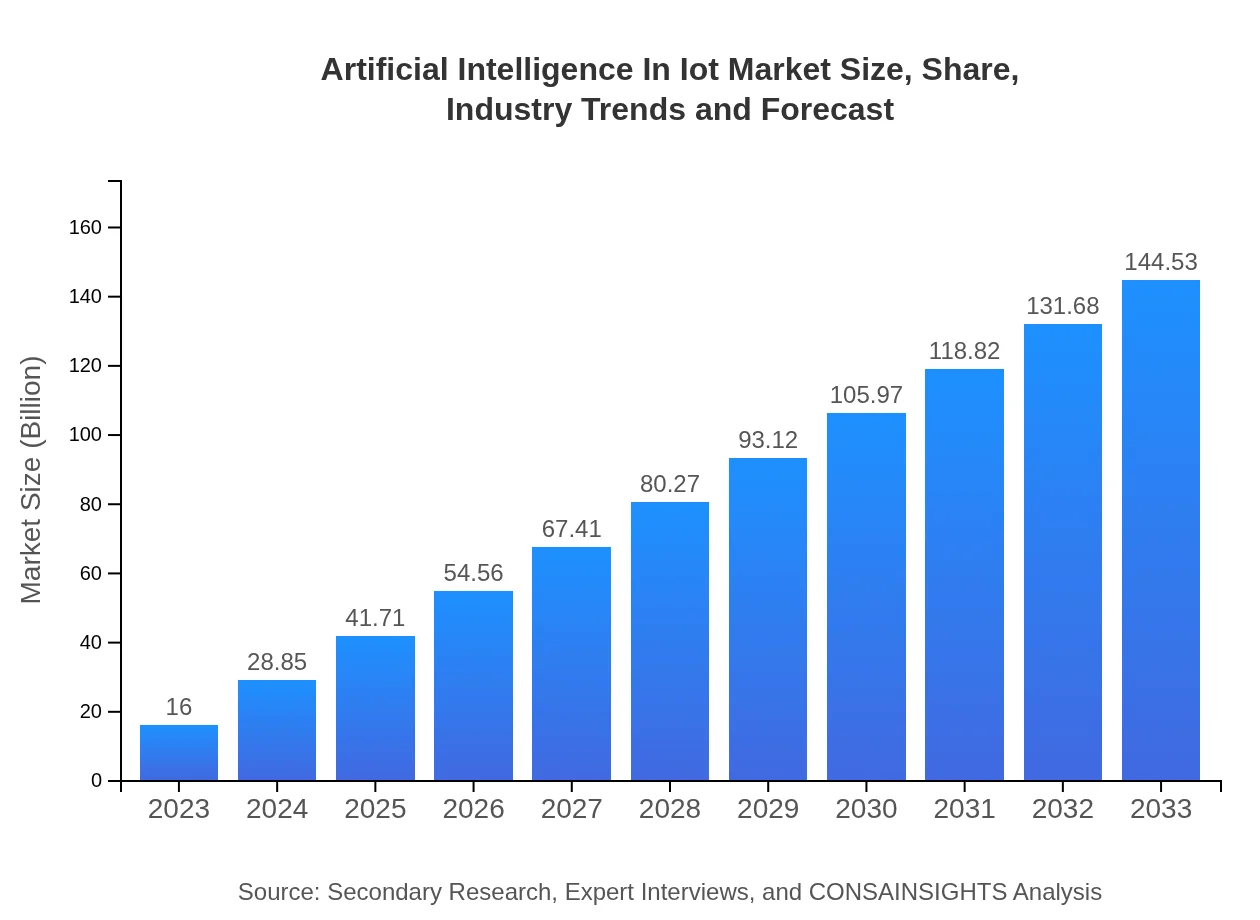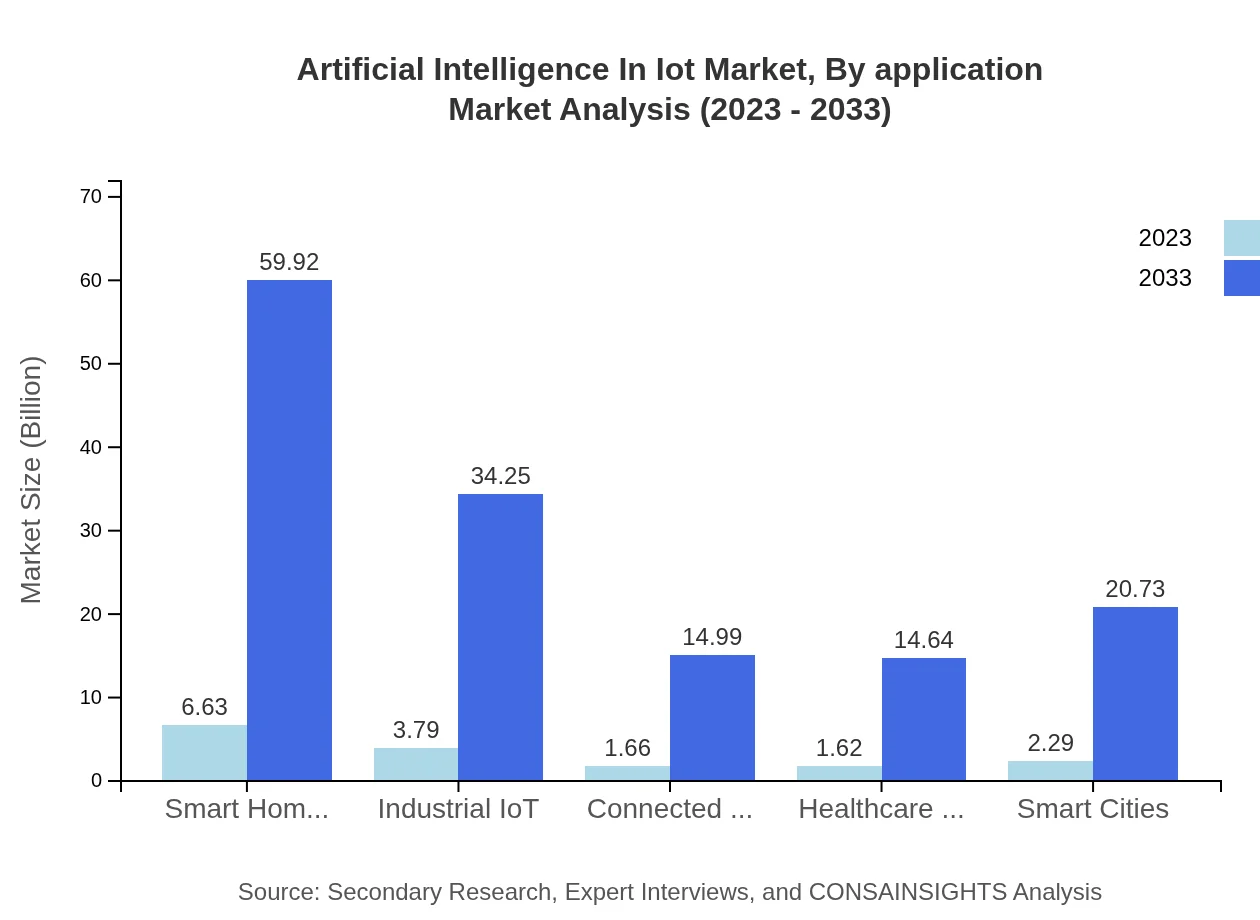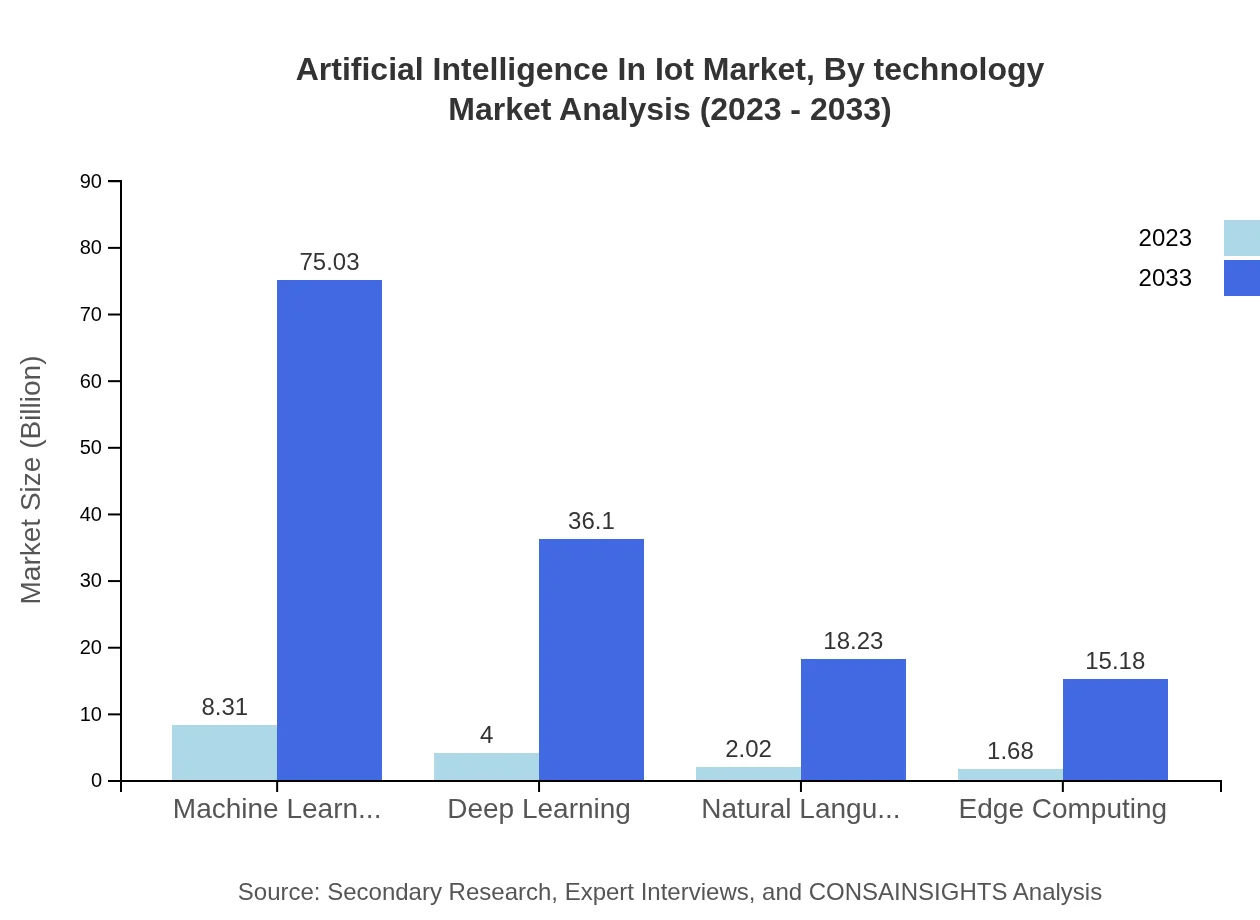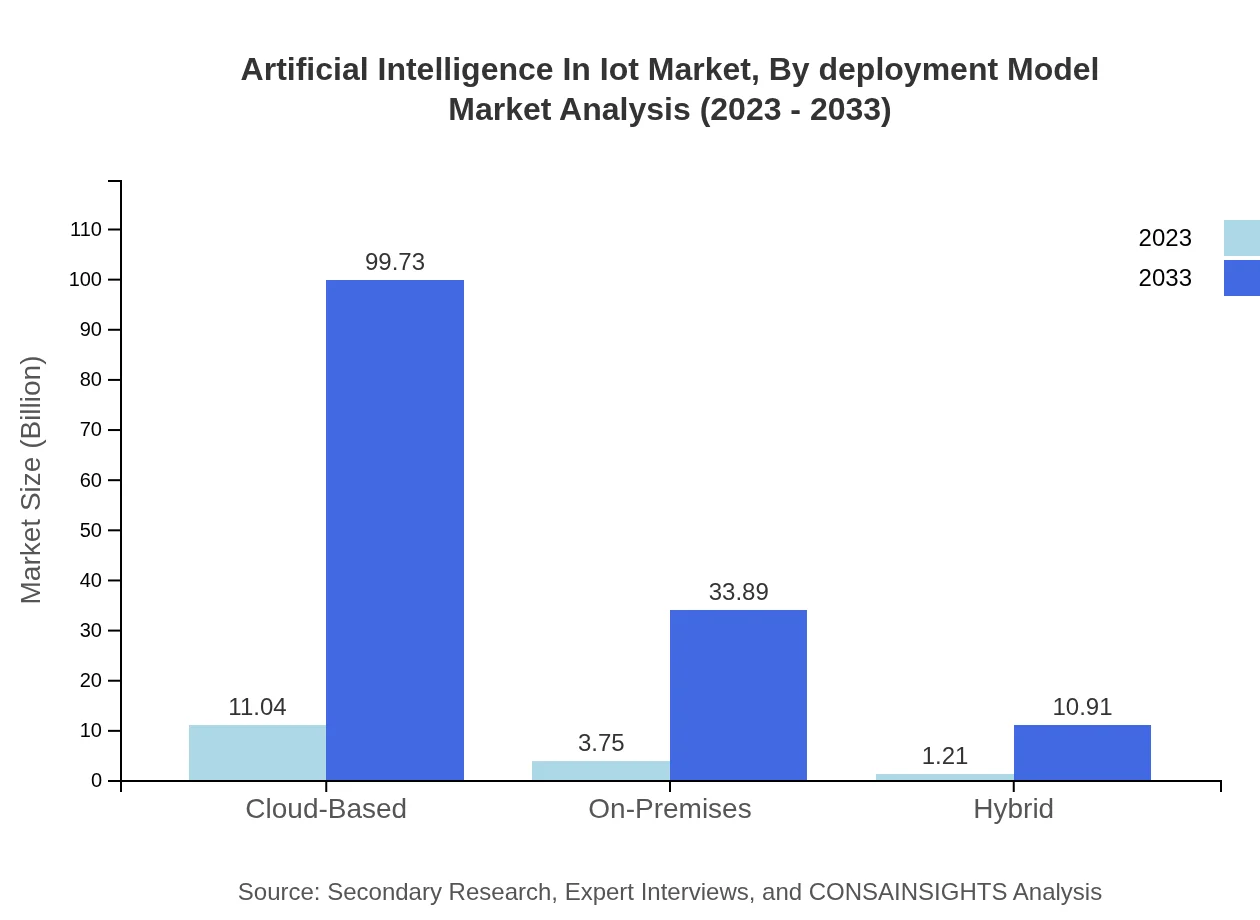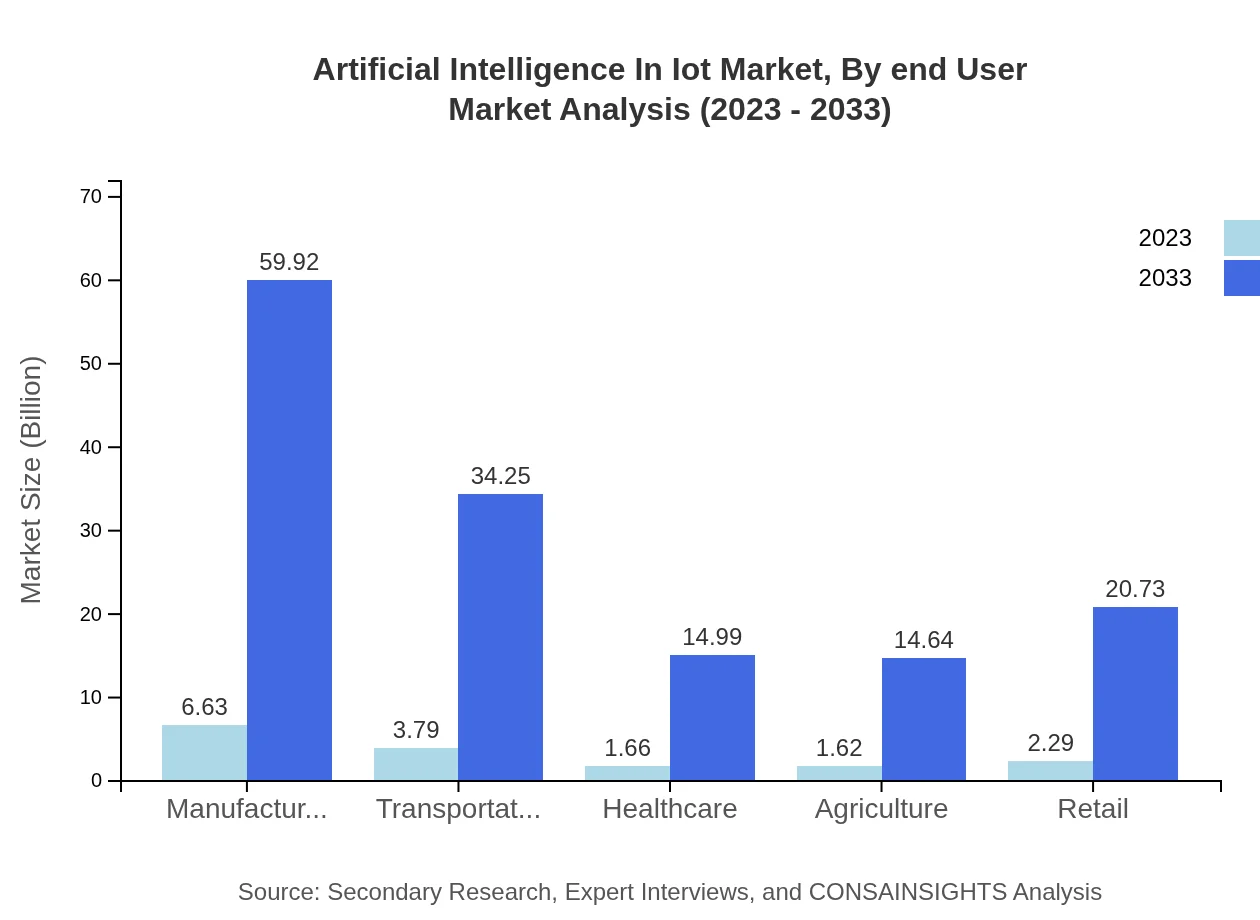Artificial Intelligence In Iot Market Report
Published Date: 31 January 2026 | Report Code: artificial-intelligence-in-iot
Artificial Intelligence In Iot Market Size, Share, Industry Trends and Forecast to 2033
This comprehensive report explores the growth and evolution of Artificial Intelligence in IoT from 2023 to 2033, offering insights into market size, trends, regional dynamics, and key players shaping the industry landscape.
| Metric | Value |
|---|---|
| Study Period | 2023 - 2033 |
| 2023 Market Size | $16.00 Billion |
| CAGR (2023-2033) | 23.1% |
| 2033 Market Size | $144.53 Billion |
| Top Companies | IBM, Microsoft, Google, Amazon Web Services (AWS), Siemens |
| Last Modified Date | 31 January 2026 |
Artificial Intelligence In IoT Market Overview
Customize Artificial Intelligence In Iot Market Report market research report
- ✔ Get in-depth analysis of Artificial Intelligence In Iot market size, growth, and forecasts.
- ✔ Understand Artificial Intelligence In Iot's regional dynamics and industry-specific trends.
- ✔ Identify potential applications, end-user demand, and growth segments in Artificial Intelligence In Iot
What is the Market Size & CAGR of Artificial Intelligence In IoT market in 2023?
Artificial Intelligence In IoT Industry Analysis
Artificial Intelligence In IoT Market Segmentation and Scope
Tell us your focus area and get a customized research report.
Artificial Intelligence In IoT Market Analysis Report by Region
Europe Artificial Intelligence In Iot Market Report:
Europe's AI in IoT market is anticipated to grow from $4.22 billion in 2023 to $38.11 billion by 2033. The region's focus on enhancing energy efficiency and sustainability initiatives in industries supports the burgeoning demand for AI-integrated IoT solutions.Asia Pacific Artificial Intelligence In Iot Market Report:
The Asia Pacific region is witnessing rapid growth in the AI in IoT market, with a market size projected to increase from $3.11 billion in 2023 to $28.11 billion by 2033. The rise of smart factories, urbanization, and government initiatives aimed at digital transformation are key drivers of this growth.North America Artificial Intelligence In Iot Market Report:
In North America, the market size is expected to surge from $5.71 billion in 2023 to $51.54 billion by 2033, primarily driven by technological advancements, robust infrastructure, and significant investments in AI research and development.South America Artificial Intelligence In Iot Market Report:
The South America market is expanding, with projections from $1.01 billion in 2023 to $9.11 billion by 2033. Adoption of smart technologies in sectors such as agribusiness and urban development enhances the region's growth potential.Middle East & Africa Artificial Intelligence In Iot Market Report:
The Middle East and Africa market estimates a growth from $1.96 billion in 2023 to $17.66 billion by 2033. Smart city projects and investment in infrastructure are pivotal in driving the adoption of AI and IoT technologies.Tell us your focus area and get a customized research report.
Artificial Intelligence In Iot Market Analysis By Application
The application segment showcases a diverse range of uses for AI in IoT across various industries. For instance, the manufacturing sector is projected to see a market size increase from $6.63 billion in 2023 to $59.92 billion by 2033, illustrating the sector's robust reliance on AI-enhanced automation. Transportation and logistics will grow from $3.79 billion to $34.25 billion, highlighting the sector's transition towards smart logistics management. Healthcare applications will also see impactful growth, with sizes increasing from $1.66 billion to $14.99 billion, demonstrating AI's influence in enhancing patient care through smart devices.
Artificial Intelligence In Iot Market Analysis By Technology
Technologies integral to the AI in IoT market include Machine Learning, which is expected to grow from $8.31 billion in 2023 to $75.03 billion by 2033, signifying its pivotal role in data processing. Similarly, Deep Learning is projected to achieve a market size rise from $4.00 billion to $36.10 billion, reflecting its growing significance in complex application processing. Additionally, Natural Language Processing (NLP) will advance from $2.02 billion to $18.23 billion, emphasizing the surge in voice-activated AI devices.
Artificial Intelligence In Iot Market Analysis By Deployment Model
The deployment model segment comprises Cloud-Based, On-Premises, and Hybrid solutions. Cloud-based deployments are anticipated to ascend from $11.04 billion to $99.73 billion by 2033, driven by scalability and flexibility requirements. Conversely, on-premises solutions will see growth from $3.75 billion to $33.89 billion, emphasizing data security concerns. Hybrid models, although currently smaller, are expected to progress from $1.21 billion to $10.91 billion as organizations seek blended solutions.
Artificial Intelligence In Iot Market Analysis By End User
In terms of end-users, the B2B sector will dominate, with growth from $11.04 billion to $99.73 billion over the decade, due to heightened demand for AI services among businesses. The B2C sector will experience parallel growth, climbing from $3.75 billion to $33.89 billion, showcasing the increasing interconnectedness of consumer devices. The C2C segment will also rise, though more modestly, from $1.21 billion to $10.91 billion, driven by collaborative technologies.
Artificial Intelligence In IoT Market Trends and Future Forecast
Tell us your focus area and get a customized research report.
Global Market Leaders and Top Companies in Artificial Intelligence In IoT Industry
IBM:
IBM is a pioneer in integrating AI with IoT, providing advanced analytics and cloud solutions to enhance operational efficiency across industries.Microsoft:
Microsoft’s Azure IoT platform leverages AI technologies to offer comprehensive solutions, empowering enterprises with data-driven insights and intelligent automation.Google:
Google is expanding its AI capabilities through smart IoT products and a focus on machine learning, providing robust platforms for analysis and real-time data processing.Amazon Web Services (AWS):
AWS integrates AI solutions with IoT in cloud-based services, driving innovation in industries from retail to logistics through intelligent data applications.Siemens :
Siemens focuses on industrial IoT solutions, enhancing manufacturing processes through AI technologies that ensure smarter factories and effective resource management.We're grateful to work with incredible clients.









FAQs
What is the market size of Artificial Intelligence in IoT?
The market size for Artificial Intelligence in IoT is projected to reach $16 billion by 2033, with a remarkable CAGR of 23.1% from 2023 to 2033. This growth indicates strong demand and progressive advancements in AI technologies within the IoT sector.
What are the key market players or companies in the Artificial Intelligence in IoT industry?
Key players in the Artificial Intelligence in IoT industry include major tech companies that specialize in AI, cloud computing, and IoT solutions. Notable companies focus on integrating AI into IoT applications to enhance automation, analytics, and overall performance in various sectors.
What are the primary factors driving the growth in the Artificial Intelligence in IoT industry?
Primary growth factors for the Artificial Intelligence in IoT industry include increasing data volume generated by IoT devices, rising demand for automation, and advancements in machine learning technologies. Moreover, the need for enhanced data analytics capabilities is propelling market growth.
Which region is the fastest Growing in the Artificial Intelligence in IoT?
North America is the fastest-growing region in the Artificial Intelligence in IoT market, expected to expand from $5.71 billion in 2023 to $51.54 billion by 2033. The region's technological advancements significantly contribute to this growth trajectory.
Does ConsaInsights provide customized market report data for the Artificial Intelligence in IoT industry?
Yes, ConsaInsights offers customized market report data tailored to specific needs within the Artificial Intelligence in IoT industry. Clients can request detailed insights, segmented analyses, and forecasts based on their unique market interests.
What deliverables can I expect from this Artificial Intelligence in IoT market research project?
Deliverables from the Artificial Intelligence in IoT market research project typically include comprehensive market analysis, segmented data reports, competitive landscape assessments, and forecasts. Customized reports can provide deeper insights based on specific industry demands.
What are the market trends of Artificial Intelligence in IoT?
Market trends in Artificial Intelligence in IoT indicate a shift towards cloud-based solutions, increased focus on smart home technologies, and enhanced integration of AI in sectors like transportation, healthcare, and manufacturing. These trends highlight the evolution of AI applications across various industries.

